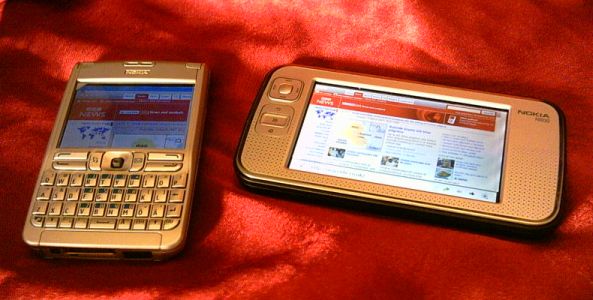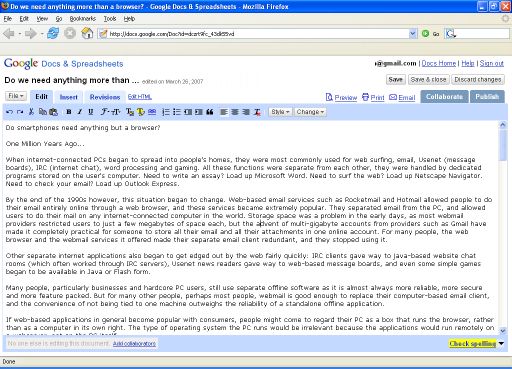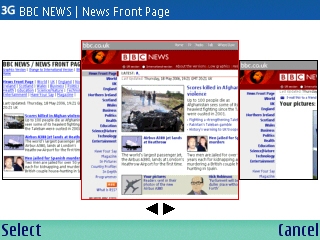By the end of the 1990s however, this situation began to change. Web-based email services such as Rocketmail and Hotmail allowed people to do their email entirely online through a web browser, and these services became extremely popular. They separated email from the PC, and allowed users to do their mail on any internet-connected computer in the world. Multi-gigabyte accounts from providers such as Gmail then made it completely practical for someone to store all their email and all their attachments in one online account. Many people stopped using separate email clients completely.
Other separate internet applications also began to get edged out by the web fairly quickly: IRC clients gave way to Java-based web chat rooms, Usenet news readers gave way to web-based message boards, and even some simple games began to be available in Java or Flash form.
Many people, particularly businesses and hardcore PC users, still use separate offline software as it is almost always more reliable, more secure and more feature packed. But for many other people, perhaps most people, webmail is good enough to replace their computer-based email client, and the convenience of not being tied to one machine outweighs the reliability of a standalone offline application.
As web-based applications in general become popular, people might come to regard their PC just as a box that runs the browser, rather than as a computer in its own right. The type of operating system the PC runs would be irrelevant.
Could this happen to smartphones too? Is the smartphone's browser the only app we will really need in the future?
Will the browser eat the operating system?
 The idea of the browser supplanting the computer's own operating system isn't a new one. When web-based Java applications first appeared in the 1990s, many predicted they could be the biggest threat to Microsoft's Windows monopoly by sidestepping the PC's OS completely.
The idea of the browser supplanting the computer's own operating system isn't a new one. When web-based Java applications first appeared in the 1990s, many predicted they could be the biggest threat to Microsoft's Windows monopoly by sidestepping the PC's OS completely.
It seems that the Java evangelists were being a bit too optimistic, as the mass migration of apps from Windows to the web just hasn't happened yet.
However, recent developments such as the widespread availability of always-on high speed broadband connections and the rise of things like AJAX have changed things, and put the idea of an irrelevant computer OS back on the table.
AJAX is a technique which combines various web technologies such as Javascript and XML to make a web site look and behave like a standalone PC application. Google's slickest web services such as Gmail, Google Maps and Google Documents and Spreadsheets have made this technique familiar to a wider audience, and while web apps like these will never be as feature-packed or as reliable as standalone applications, for most people in most situations they're good enough. They're also accessible through any internet-connected AJAX-compatible device, and will probably spawn a thousand similar rivals. Even Microsoft is planning to offer an online word processing and spreadsheets service, despite being the largest maker of offline word processors and spreadsheet software.
One of the driving forces behind the original takeup of webmail were students, who loved the way they could browse their email on any faceless university computer, and then continue using exactly the same account in exactly the same way on their home PC during the holidays. It's not hard to see how web-based word processors could become similarly widely used, as they allow work on documents (including wiki-like collaborations between many different users) on any compatible internet-connected computer.
If most people end up doing their email, word processing and spreadsheets through their web browser, why not other services? Why should people have to use any application offline if they would prefer to use it online?
The Mobile Dimension
So far this exodus of applications from the desktop to the web browser has been largely restricted to PCs, but smartphones are on the verge of being able to join in. Many portable computing devices such as the Nokia N800 are already compatible with AJAX web services such as Gmail, and can display such sites exactly as a PC does (Google Maps, Gmail). It can't be long before this compatibility spreads to smartphones.
Once that happens, the web service providers will probably offer a wider range of interface options to suit the different screens that smartphones tend to have, and then web-based apps will start to become a serious alternative to smartphone-based apps.

Converging the computing world
Separating smartphone hardware from its applications by using web-based apps could bring an incredible amount of choice to consumers. They could use as many different devices as they wanted without having to ever sync their files. They could use the same web applications on any smartphone model, from any manufacturer, running any operating system. As long as the smartphones all contain a browser compatible with the required web applications, they would become completely interchangeable, and not just with each other but also with desktop computers and everything in-between such as laptops and UMPCs.
Users would also be able to mix and match applications as they see fit, instead of waiting for them to be ported to their particular device (if they ever are ported), and they wouldn't be tied to the bundle of apps that manufacturers include with smartphones.
The currently separate application ecosystems of different OSes could merge into one completely open web-based ecosystem, where the only significant task of a computing device such as a PC or smartphone is to render web sites correctly. As far as end users would be concerned, the web browser and computer would become the same thing, just as a television tuner and a television set are regarded as the same thing.
From a consumer point of view, there wouldn't be any PCs or smartphones any more, just browsing devices of various shapes and sizes, from desktop to laptop to pocket-size.
Is this how we will access our smartphone apps in the future?
A Renaissance For Smartphones & Smartphone Apps
Because a move to browser-based apps would end the "format war" between rival software platforms, people would be able to buy a portable computing device with confidence and smartphone sales could benefit from this, the way that sales of DVD players benefited from DVD being a unified format.
Use of add-on applications could also increase considerably: web based services can be used without any sort of technical knowledge or installation procedure, you just need to know and enter the relevant web address. It would be incredibly easy to try web apps and tell others about them, and if a web service works the same way on a smartphone and PC, PC users will be far more tempted to get a smartphone as they'd just see it as a portable version of something they already use.
It's a sad fact that most smartphone owners never use a third party piece of software, partly because they're unaware such things exist, partly because they're not sure whether they have a compatible model and partly because it's so fiddly to actually find, download and install an application. If apps were web based, the whole process of finding and using them would be seamless, and all that developers would have to worry about is getting their web address as widely advertised as possible. The device's browser would become the only meaningful application actually on the phone, and as browsers would all be designed to render to the same standards, there wouldn't be much to choose between them.
Web-based Smartphone Gaming
 Perhaps the greatest technical challenge for web-based applications is gaming. Cutting edge games use more computing power than any other consumer computer applications, and they also take up the most storage space, which makes them least suited to being used through a browser.
Perhaps the greatest technical challenge for web-based applications is gaming. Cutting edge games use more computing power than any other consumer computer applications, and they also take up the most storage space, which makes them least suited to being used through a browser.
But what kind of games do people actually use on the move? Most of the time they're simpler titles than on a desktop PC, and many successful handheld console games such as the Nintendo DS's Zoo Keeper are actually just re-releases of web-based Flash games. Even some original console-only handheld titles such as the hugely popular Warioware for the GBA could easily be done as web-based Flash games.
While road testing the Nokia N800 I was able to play Flash and Java games using the web browser, and they loaded and worked just as they do on a PC web browser. Web-based Flash is a good enough platform for most 2D games, and most S60 smartphone games could probably be remade for the web in some form.
Of course titles with cutting edge graphics will always be too challenging for a web-based release, and gaming could split along the same lines as users of other types of applications: the hardcore people who use these services heavily will stick to a separate offline client, while the more casual majority go for the convenience of web-based software.
But there's a catch...
 The fundamental catch with web services is that your device has to be connected to the internet in order for them to work. You can't read or write an email offline on webmail, you can't edit a document offline on Google Documents, you can't watch a video offline on YouTube.
The fundamental catch with web services is that your device has to be connected to the internet in order for them to work. You can't read or write an email offline on webmail, you can't edit a document offline on Google Documents, you can't watch a video offline on YouTube.
However, these objections against web apps on PCs were strongest in the days of unreliable and expensive metered dial-up connections. When you were paying a per-minute price for a connection which also tied up your phone line, it seemed ridiculous to stay connected to the internet while writing an email. But that problem was solved as widespread flat rate and always-on broadband connections became available, where it made no difference whether you wrote an email online or offline. Broadband does still break down sometimes, but this is relatively rare nowadays, and most users seem to feel it's a price worth paying for the sake of the convenience that web services bring.
Connectivity doesn't have to be perfect for people to want to use web apps, it just has to be good enough. If people can almost always access their webmail, most of them won't care if it's inaccessible a handful of times a year.
It's also worth remembering that PCs themselves aren't 100% reliable. When PCs break down, you can't just use another computer because all your files are on the broken one. Web-based apps store all their files online, usually on servers that are regularly backed up, and they let you seamlessly move from one computer to another whenever you like. In terms of protection against hardware problems, web-based apps are actually more reliable than offline apps.
...and mobile web apps have even more catches too
Web-based apps obviously have huge potential to become very popular with the average consumer, and on the desktop PC they may well become the norm for most people over the next decade or so. But with mobile devices the challenges for web-based apps are much greater, for several significant reasons:
Lack of Compatible Handsets - Manufacturers have to start making a majority of their smartphones compatible with the most commonly used web app technologies. At the moment, smartphones can handle HTML and javascript with no problems, but usually run into problems with Flash, AJAX and other advanced techniques. The Nokia N800 shows it's now possible to make a light, portable and relatively cheap device (well, cheaper than the E90!) which can handle consumer web apps just like a PC. The latest S60 browser will apparently have AJAX compatibility (although I still haven't seen the full version of Gmail running on an S60 device yet). We will almost certainly see PC-like web app compatibility in future smartphones, but we have to wait for it to happen.
Operator Sabotage - Phone network operators have a habit of standing in the way of progress in the mobile world. Web-based apps might not fit in with their game plan, and they could try to put all kinds of spanners in the works to stop web apps working, as they've tried to do with Bluetooth and Wi-fi in the past. It may be taken out of their hands however, as more and more devices become compatible with non-operator wireless standards such as Wi-fi and Wimax. Operators could be forced to open up to web apps in the same way they were forced to abandon their "walled garden" internet services and provide direct access to all web sites.
High Mobile Internet Costs - The cost of mobile internet access still has to drop significantly worldwide. This is already starting to happen in most countries, and many networks now allow you to buy unlimited uncapped 3G mobile internet access for a (still quite high) flat monthly fee. Phone models with Wi-fi also allow people to get high speed unmetered internet access at home or in hotspots.
Lack Of High Speed Wireless - 3G and even faster services are far more widely available now than a few years ago, but there's still a long way to go. Many countries including, bizarrely, the United States have very poor coverage even for 2G services, with enormous gaps where there's no wireless coverage of any kind. For web-based apps to replace phone-based apps, these gaps have to be closed.
Unoptimised Web Apps - Web app providers have to adapt their offerings for mobile devices. Once AJAX compatibility arrives in phone browsers, it will be up to Google to make an AJAX version of Gmail which is as usable as possible on a smaller screen. At the moment AJAX Gmail still assumes you have access to a full size keyboard and full size horizontal screen, which would make it awkward to use on an AJAX-compatible phone.
All these are significant problems, and at the moment it might seem almost unthinkable that we would ever come to depend on something as unpredictable as mobile wireless networks for access to our mobile applications. But that's how it seemed in the days when PC internet connections were similarly patchy. Mobile networks aren't going to remain unreliable forever, they're developing so quickly and becoming so cheap to roll out that even the poorest countries in the world now have significant amounts of mobile phone coverage. More and more households are also supplementing cellular networks with their own Wi-fi networks, so people often have free high speed wireless internet access whenever they're at home.
It seems inevitable that wireless coverage (cellular, Wi-fi, Wimax and others) will improve in every country in the world and, when availability reaches a certain point, as it did with desktop PC broadband access, a lot of people will start using web apps on their phones just like they do on computers. In many countries and regions, cellular coverage is already close to 100%, and these are the places where we might get our first taste of the browser-centric smartphone.


No comments:
Post a Comment